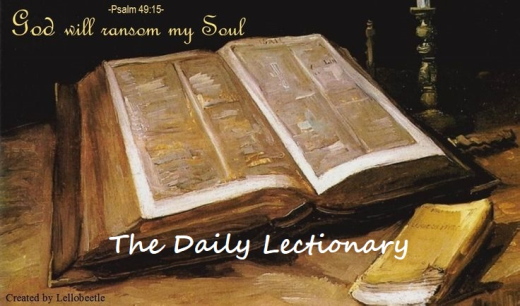The Daily Lectionary
MONDAY, May 25, 2020
Psalm 99; Leviticus 9:1-11, 22-24; 1 Peter 4:1-6
(Revised Common Lectionary Year A)
Priests and people praise God
1 The Lord reigns,
let the nations tremble;
he sits enthroned between the cherubim,
let the earth shake.
2 Great is the Lord in Zion;
he is exalted over all the nations.
3 Let them praise your great and awesome name—
he is holy.
4 The King is mighty, he loves justice—
you have established equity;
in Jacob you have done
what is just and right.
5 Exalt the Lord our God
and worship at his footstool;
he is holy.
6 Moses and Aaron were among his priests,
Samuel was among those who called on his name;
they called on the Lord
and he answered them.
7 He spoke to them from the pillar of cloud;
they kept his statutes and the decrees he gave them.
8 Lord our God,
you answered them;
you were to Israel a forgiving God,
though you punished their misdeeds.
9 Exalt the Lord our God
and worship at his holy mountain,
for the Lord our God is holy.
The high priest Aaron offers sacrifice
9:1 On the eighth day Moses summoned Aaron and his sons and the elders of Israel. 2 He said to Aaron, “Take a bull calf for your sin offering and a ram for your burnt offering, both without defect, and present them before the Lord. 3 Then say to the Israelites: ‘Take a male goat for a sin offering, a calf and a lamb—both a year old and without defect—for a burnt offering, 4 and an ox and a ram for a fellowship offering to sacrifice before the Lord, together with a grain offering mixed with olive oil. For today the Lord will appear to you.’”
5 They took the things Moses commanded to the front of the tent of meeting, and the entire assembly came near and stood before the Lord. 6 Then Moses said, “This is what the Lord has commanded you to do, so that the glory of the Lord may appear to you.”
7 Moses said to Aaron, “Come to the altar and sacrifice your sin offering and your burnt offering and make atonement for yourself and the people; sacrifice the offering that is for the people and make atonement for them, as the Lord has commanded.”
8 So Aaron came to the altar and slaughtered the calf as a sin offering for himself. 9 His sons brought the blood to him, and he dipped his finger into the blood and put it on the horns of the altar; the rest of the blood he poured out at the base of the altar. 10 On the altar he burned the fat, the kidneys and the long lobe of the liver from the sin offering, as the Lord commanded Moses; 11 the flesh and the hide he burned up outside the camp.
22 Then Aaron lifted his hands toward the people and blessed them. And having sacrificed the sin offering, the burnt offering and the fellowship offering, he stepped down.
23 Moses and Aaron then went into the tent of meeting. When they came out, they blessed the people; and the glory of the Lord appeared to all the people. 24 Fire came out from the presence of the Lord and consumed the burnt offering and the fat portions on the altar. And when all the people saw it, they shouted for joy and fell facedown.
Live by the will of God
4:1 Therefore, since Christ suffered in his body, arm yourselves also with the same attitude, because whoever suffers in the body is done with sin. 2 As a result, they do not live the rest of their earthly lives for evil human desires, but rather for the will of God. 3 For you have spent enough time in the past doing what pagans choose to do—living in debauchery, lust, drunkenness, orgies, carousing and detestable idolatry. 4 They are surprised that you do not join them in their reckless, wild living, and they heap abuse on you. 5 But they will have to give account to him who is ready to judge the living and the dead. 6 For this is the reason the gospel was preached even to those who are now dead, so that they might be judged according to human standards in regard to the body, but live according to God in regard to the spirit.
Optional parts of the readings are set off in [square brackets.]
The Bible texts of the Old Testament, Epistle, and Gospel lessons are from The Holy Bible, New International Version®, NIV® Copyright ©1973, 1978, 1984, 2011 by Biblica, Inc.® Used by permission. All rights reserved worldwide.
The Daily Lectionary is a three-year cyclical lectionary. We are currently in Year A. Beginning with the first Sunday of Advent in 2020, we will be in Year B. The year which ended at Advent 2019 was Year C. These readings complement the Sunday and festival readings: Thursday through Saturday readings help prepare the reader for the Sunday ahead; Monday through Wednesday readings help the reader reflect and digest what they heard in worship. Revised Common Lectionary Daily Readings, copyright © 2005 Consultation on Common Texts. www.commontexts.org
The Daily Lectionary for MONDAY, May 25, 2020
Psalm 99; Leviticus 9:1-11, 22-24; 1 Peter 4:1-6










